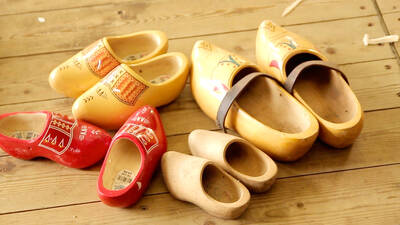A black and brown leather lace-up shoe named after the Iraqi journalist who threw his footwear at former US president George W. Bush has become a top seller in northeastern Bangladesh.
Shoe sellers in the city of Sylhet had named the “Zaidi shoe” in a bid to cash in on the popularity of reporter Muntazer al-Zaidi, who became a folk hero in Bangladesh after hurling his shoes at Bush during a press conference in Baghdad December last year.
“It’s the latest fad in Sylhet. Every one wants to be wearing the Zaidi,” shop owner Abdul Awal told AFP.
“It looks like your average men’s dress shoe but it’s been sold for up to 2,200 taka (NT$1,034) which is at the very top end of the market in Bangladesh,” Awal said.
Sales have shot up in the run in to Eid al-Fitr next week, which marks the end of the Muslim holy month Ramadan, when Bangladeshis traditionally shop for new clothing.
“Younger men, especially, are buying the shoes as a mark of their respect to Zaidi,” said Faruq Mahmud Chowdhury, a top businessman in Sylhet.
Zaidi, 30, was initially sentenced to three years in jail for assaulting a foreign head of state, but had that reduced to one year on appeal.
He was released last week for good behavior.(AFP)
一款以朝美國前總統喬治.W.布希丟鞋的伊拉克記者命名的黑、棕色綁帶皮鞋,現在已成為孟加拉東北部地區的暢銷商品。
錫爾赫特市的鞋商把這種鞋取名為「柴迪鞋」,想藉著記者穆塔瑟.柴迪的知名度大賺一筆;去年十二月在巴格達的一場記者會上,柴迪把自己的鞋子扔向小布希後,成為民間英雄。
「這是錫爾赫特的最新時尚。每個人都想穿上柴迪鞋,」店主阿布杜.阿瓦爾告訴法新社。
阿瓦爾說:「這雙鞋看起來就像是一般的男士鞋,不過一雙柴迪鞋最高賣到兩千兩百塔卡(新台幣一千零三十四元),這在孟加拉是非常頂級的高檔貨。」
代表伊斯蘭神聖齋月結束的開齋節下週即將到來,買氣迅速加溫。孟加拉人的習俗是在開齋節前添購新衣。
「尤其是年紀較輕的男子會買這雙鞋來表達對柴迪的敬意,」錫爾赫特的成功企業家法魯.馬穆德.喬赫里說。
三十歲的柴迪因攻擊外國元首,最初被判處三年有期徒刑,但經上訴後減刑為一年。
他因表現良好,已於上週獲釋。(法新社╱翻譯:袁星塵)

Denmark’s state-run postal service, PostNord, announced that it would cease letter deliveries at the end of 2025 due to the impact of digitalization. As 95% of its residents now use the Digital Post service, Denmark has seen a 90% decline in letter volumes since 2000, from 1.4 billion to 110 million last year. On top of that, the Postal Act of 2024 removes the government’s obligation to provide universal mail service and puts an end to postal exemptions from value-added tax, raising the cost of a single letter to 29 Danish krone (US$4.20). As a result, PostNord is switching

Bilingual Story is a fictionalized account. 雙語故事部分內容純屬虛構。 “One DA-BEI... WU LONG... NAI?” Yujing smiled as the foreigner struggled to order. He looked like an embarrassed puppy. She repeated the order in Chinese, then English: “Oolong milk tea, large size. Half sweet, no ice?” she said gently. He beamed — the kind of full-face, sunshine smile that Latinos are famous for. “Yes! That! You are... lo maximo… the best!” After he left, Lily nudged her. “Nice save. You’re getting the hang of it.” Yujing had taken this summer job at the bubble tea shop to build confidence and get work

When you think of the Netherlands, images of tulips, windmills, and iconic wooden shoes — known as “Dutch clogs” — may come to mind. These traditional shoes are rich in cultural significance. For centuries, Dutch clogs have been admired for their sturdy design and impressive craftsmanship, making them a fascinating symbol of Dutch heritage. Dutch clogs date back to the Middle Ages. During that time, farmers and laborers needed durable shoes to cope with the region’s damp and unpredictable climate and topography. Crafted from solid wood, such as willow or poplar, clogs offered outstanding protection. Their firm structure kept

Although sending you an SMS (Short Message Service) verification code provides some security, many apps now use code-generating apps and two-factor authentication instead. But more recently, passkeys now use a biometric approach to logging in. Biometrics can offer an even more secure alternative. Following this trend, Google is reportedly planning to replace SMS verification codes with “QR code” scanning. SMS codes are currently used to verify user identity and prevent fraudsters from creating fake Gmail accounts to distribute spam. However, these codes present several challenges. They can be phished through suspicious links, and users may not always have access